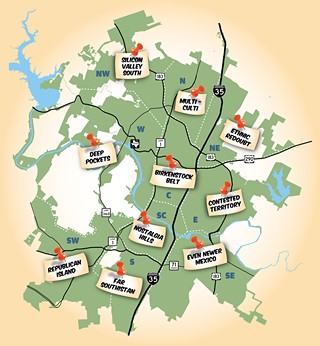Point Austin: Chartering a New Course
A thumbnail portrait of the proposed City Charter propositions
By Michael King, Fri., Sept. 21, 2012

This week my colleague Amy Smith ("Then There's This") takes a useful first look at the city's bond proposals, on what promises to be a very lengthy Nov. 6 ballot. I thought I would return the favor, with a first, summary review of the rest of the city propositions (that is, the proposed City Charter amendments, 1 through 11). Some of these we've already reported on at some length, but I suspect most readers (and voters) would be happy for a set of summaries – by the time we reach this page on the e-reader beginning with the presidential race, et al., eyes will be glazing. (Note: The Chronicle editorial board – a very moveable feast – has not yet met to discuss any of these proposals, so "Point Austin" is speaking entirely on its own.)
The Big Ones
Here we go, in (roughly) descending order of importance:
Props. 3 & 4: Geographical Council Districts. Prop. 3 is the "10-1" districting proposal (plus "independent commission"), Prop. 4 is the "8-2-1" proposal (keeping two at-large seats). Advocates on either side are taking sharply polarized positions, but it's worth noting up front that either plan would be an improvement over an at-large council now too small for a city of more than 800,000 residents. Arguably, a 10-1 plan would encourage ward politics (and the "independent" commission is a Rube Goldberg contraption invisible on the ballot); the 8-2-1 proponents may be relying too much on "diversity" arguments and the anticipated resistance of an electorate that has six times rejected districting. If both props achieve 50%, the proposal with the most votes win; if neither achieves 50%, districting goes down once again (unless imposed by the courts).
Props. 1 & 2: Electoral Reform. Prop. 1 would move council elections from May to November; Prop. 2 would do that, as well as establishing (corollary) four-year, staggered terms, even-year elections, and two-term limits. Support is strong for the move to November, which indeed should have been done earlier, by ordinance, but foundered over inside politics games at council prior to the last election. Some argue that May elections are less distracted by state or national issues, but spring turnout is now so low that it seems only rational to move to November, in even years to coincide with other jurisdictions that have already moved. Term limits are a libertarian, antidemocratic invention, but apparently here to stay; combined with the other provisions, these props look like slam-dunks – although it would be amusing to see the official consternation (and head-scratching) if 2 passes and 1 fails.
Props. 10 & 11: Employee Civil Service Rights. Prop. 11 would grant full civil service rights, akin to those of other public safety employees, to emergency medical service personnel (as allowed under state law); Prop. 10 would grant more limited civil service protection (basically, independent appeal rights on hiring, firing, and discipline). Taking false financial cues that came from city management (since withdrawn), the Statesman has gone apoplectic on Prop. 10, suggesting it will bankrupt the city, although its financial effects could well be beneficial. In fact, these are both necessary reforms in a "right-to-work" state that goes out of its way to stack the deck against workers' rights.
Prop. 7: Reduce petition signatures for citizen-initiated ordinances. Prop. 7 would lower the number of signatures required to force a vote on an ordinance change to match those required (under state law) for charter changes. Frankly, the charter requirement is too low, but having the ordinance requirement higher is even more irrational and cumbersome. Since state law won't change for the foreseeable future, this is our default choice.
The Lesser Priorities
Props. 5 & 6: City Council hire own staff and appoint City Attorney. Prop. 5 essentially recognizes what is the de facto procedure already (city management formally ratifies council hires, but it's an unnecessary and misleading process); Prop. 6 responds to the longstanding struggle over who the city attorney ultimately answers to. It's unlikely either of these changes will have dramatic effects, but when there's an occasional showdown on policy, it's probably best for the council to be the attorney's direct client.
Prop. 9: Allow leasing of city parkland to school districts. This is from the city's grab-bag of attempts to collaborate with Austin ISD on specific needs not otherwise supported by state funding, and would require a two-thirds vote for any specific lease. While it makes park advocates nervous, council discussion focused on very specific uses that would benefit both the city and schools; the actions are likely to be very limited.
Prop. 8: Allow council members to raise political funds 30 days after election. Leaving CMs in campaign debt over what are already quite restricted funding limits is not a way to get better government; it's a way to elect even more distracted representatives. One of the arguments for districting is that it will make it less expensive to run for office. Austin's overreactive campaign finance limits have incrementally led to only wealthy, self-funded council candidates. Prop. 8 would make it slightly easier to run a campaign without being buried in debt.
The propositions are available on the city website at www.austintexas.gov/elections. Look for more coverage of the ballot propositions, and the entire November election, in weeks to come.
Follow on Twitter @PointAustin.
Got something to say on the subject? Send a letter to the editor.












